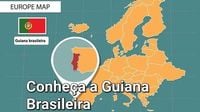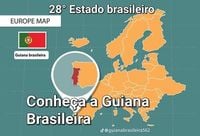In recent months, the meme "Guiana Brasileira" has spread rapidly across social media, igniting intense reactions, particularly from Portuguese users. The joke humorously suggests that Portugal is a "state of Brazil in Europe," leading to a wave of comments from Brazilians on Portuguese profiles. Phrases like "we are all Brazilians" and "Portugal is now ours" have become commonplace, provoking discomfort among some Portuguese individuals.
Originally, the meme emerged as a form of geopolitical humor, following in the footsteps of similar jokes like the "França Brasileira." However, the focus on Portugal has taken the humor to a new level, with Brazilian influencers playing a significant role in its popularity. They have been sharing videos featuring fictitious maps that depict Portugal as part of Brazil, further fueling the meme's reach.
In response to the influx of comments, several Portuguese creators have voiced their discontent. In videos shared online, they have expressed that while they are open to jokes, some comments cross the line into disrespect. One creator remarked, "Talking about a culture, a people, a flag has limits," emphasizing that certain remarks can encourage prejudice and hinder dialogue between the two nations.
The meme's rapid spread has sparked discussions about the limits of humor. Many Brazilians view the "Guiana Brasileira" as harmless fun, while Portuguese individuals argue that the joke has lost its original intent and has become a provocation. This divergence has led to debates surrounding xenophobia, cultural respect, and the implications of viral content.
As Brazilians continue to post standardized comments on Portuguese videos, music, and social media posts—often using phrases like "welcome to the federation" or "now it’s Brazilian territory"—the behavior has begun to irritate content creators in Portugal. They feel that this mass commenting is disrespectful and undermines the cultural exchange between the two countries.
Experts in digital behavior have raised concerns about the potential for the "Guiana Brasileira" meme to promote misinformation and perpetuate stereotypes. They advise users to practice empathy and consider the real-world consequences of their online actions. The meme, while seemingly innocuous, highlights how humor can lead to significant misunderstandings and conflicts.
The hashtag #GuianaBrasileira remains prominent on platforms like TikTok, Instagram, and X (formerly Twitter), with videos related to the theme amassing millions of views. The trend has solidified its place among younger audiences, becoming a cultural phenomenon that reflects the complexities of Brazilian-Portuguese relations.
Interestingly, the meme also touches on historical contexts, with some Brazilians referencing past grievances regarding colonialism and discrimination. Reports indicate that in 2021, there were 109 formal complaints of discrimination against Brazilians in Portugal, marking a 142% increase from 2018. Many Brazilians have reported facing challenges in renting properties, securing jobs, and accessing public services, often being told to "speak in English" rather than Brazilian Portuguese.
As the meme evolves, it has prompted Portuguese users to respond with their own videos, expressing their discomfort with the jokes. One influencer, Bruna Filipa, stated she feels "secondhand embarrassment" when she sees Brazilians mocking the Portuguese accent or making derogatory comparisons with favelas. Another user, known only as Bruno, criticized the notion that Portugal could ever be integrated into Brazil, insisting, "You keep Brazil on one side of the Atlantic, and we’ll keep Portugal on the other side."
Despite the tensions, some Portuguese influencers have taken a lighter approach. Nokas, a popular TikToker, acknowledged the creativity of Brazilians while also emphasizing the importance of respecting cultural boundaries. She quipped, "First it was the gold meme, now we are a Guiana?" highlighting the absurdity of the situation.
The meme even made its way to Wikipedia, where a page falsely claimed that Portugal had been integrated into Brazil, although it was quickly removed. This illustrates the extent to which the joke has permeated online culture, blurring the lines between humor and misinformation.
As the debate continues, it’s clear that the "Guiana Brasileira" meme serves as a reminder of the need for cultural sensitivity in humor. While laughter can bridge gaps, it can also widen them if not approached with care. The ongoing dialogue between Brazilians and Portuguese about the meme encapsulates the broader challenges of understanding and respecting diverse cultures in an increasingly connected world.
Ultimately, the "Guiana Brasileira" meme has become more than just a joke; it reflects the complexities of historical relationships, cultural identity, and the impact of social media on public discourse. As both sides navigate this humorous yet contentious terrain, the importance of mutual respect and understanding remains paramount.







